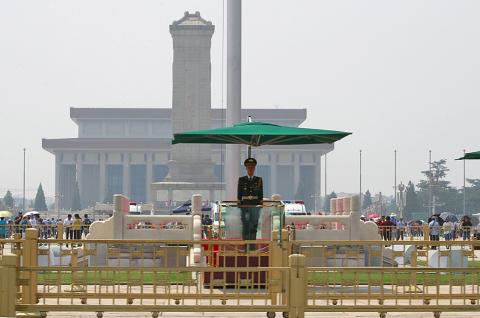Beijing yesterday marked 30 years since the Tiananmen Square Massacre with a wall of silence and extra security.
Police checked the identification cards of every tourist and commuter leaving the subway near Tiananmen Square, the site of the pro-democracy protests that were brutally extinguished by tanks and soldiers on June 3 and 4, 1989.
Foreign journalists were not allowed onto the square at all or warned by police not to take pictures.

Photo: EPA-EFE
Officials told one reporter that “illegal media behavior” could affect visa renewals.
Meanwhile, Washington marked the occasion by hailing the “heroic” movement of 1989.
The Chinese Communist Party detained several pro-democracy advocates in the run-up to yesterday, while popular livestreaming sites conspicuously shut down for “technical” maintenance.
Searches for the term “Tiananmen” on the Sina Weibo platform yesterday displayed the official logo of the 70th anniversary of the founding of communist China.
Over the years, the party has censored any discussion of the protests and crackdown, which left hundreds, possibly more than 1,000 people, dead — ensuring that people either never learn about what happened or fear to discuss it.
The party and its high-tech police apparatus have tightened control over civil society since Chinese President Xi Jinping (習近平) took office, rounding up pro-democracy advocates, rights lawyers and even Marxist students who sympathized with labor movements.
Countless surveillance cameras are perched on lampposts in and around Tiananmen Square.
“It’s not that we don’t care. We know what happened,” said a Didi Chuxing driver. “But how can I tell you when the DiDi Chuxing app is recording our conversation?”
“Today’s China has changed,” he added. “If you have money, you have everything. Without money, you dare not open your mouth.”
It was largely business as usual at Tiananmen yesterday: Hundreds of people, including children waving small Chinese flags while sitting on their parents’ shoulders, lined up to watch the daily flag-raising.
However, the line moved slowly due to extra security, with identification cards matched on facial recognition screens.
When asked whether it occurred to her that she was visiting the square on the 30th anniversary of the Tiananmen Square Massacre, a nursing school graduate in her 20s from eastern Shandong Province said: “What do you mean? No, it didn’t cross my mind.”
Her mother added: “We don’t think of that past.”

MORE VISITORS: The Tourism Administration said that it is seeing positive prospects in its efforts to expand the tourism market in North America and Europe Taiwan has been ranked as the cheapest place in the world to travel to this year, based on a list recommended by NerdWallet. The San Francisco-based personal finance company said that Taiwan topped the list of 16 nations it chose for budget travelers because US tourists do not need visas and travelers can easily have a good meal for less than US$10. A bus ride in Taipei costs just under US$0.50, while subway rides start at US$0.60, the firm said, adding that public transportation in Taiwan is easy to navigate. The firm also called Taiwan a “food lover’s paradise,” citing inexpensive breakfast stalls

TRADE: A mandatory declaration of origin for manufactured goods bound for the US is to take effect on May 7 to block China from exploiting Taiwan’s trade channels All products manufactured in Taiwan and exported to the US must include a signed declaration of origin starting on May 7, the Bureau of Foreign Trade announced yesterday. US President Donald Trump on April 2 imposed a 32 percent tariff on imports from Taiwan, but one week later announced a 90-day pause on its implementation. However, a universal 10 percent tariff was immediately applied to most imports from around the world. On April 12, the Trump administration further exempted computers, smartphones and semiconductors from the new tariffs. In response, President William Lai’s (賴清德) administration has introduced a series of countermeasures to support affected

CROSS-STRAIT: The vast majority of Taiwanese support maintaining the ‘status quo,’ while concern is rising about Beijing’s influence operations More than eight out of 10 Taiwanese reject Beijing’s “one country, two systems” framework for cross-strait relations, according to a survey released by the Mainland Affairs Council (MAC) on Thursday. The MAC’s latest quarterly survey found that 84.4 percent of respondents opposed Beijing’s “one country, two systems” formula for handling cross-strait relations — a figure consistent with past polling. Over the past three years, opposition to the framework has remained high, ranging from a low of 83.6 percent in April 2023 to a peak of 89.6 percent in April last year. In the most recent poll, 82.5 percent also rejected China’s

PLUGGING HOLES: The amendments would bring the legislation in line with systems found in other countries such as Japan and the US, Legislator Chen Kuan-ting said Democratic Progressive Party (DPP) Legislator Chen Kuan-ting (陳冠廷) has proposed amending national security legislation amid a spate of espionage cases. Potential gaps in security vetting procedures for personnel with access to sensitive information prompted him to propose the amendments, which would introduce changes to Article 14 of the Classified National Security Information Protection Act (國家機密保護法), Chen said yesterday. The proposal, which aims to enhance interagency vetting procedures and reduce the risk of classified information leaks, would establish a comprehensive security clearance system in Taiwan, he said. The amendment would require character and loyalty checks for civil servants and intelligence personnel prior to